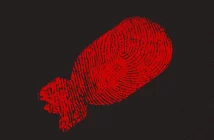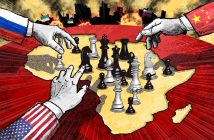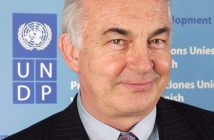BBC’s country profile on Venezuela starts with the following: “Venezuela is a country of striking natural beauty, ranging from the snow-capped Andean peaks in the west, through the Amazonian jungles in the south, to the beaches of the north… The country has some of the world’s largest proven oil deposits as well as huge quantities of coal, iron ore, bauxite and gold…”
Sadly today, a polarized Venezuela is in crisis. Millions have fled the country. Hyperinflation has made food and medicine inaccessible for many. Regime’s failures have offered external powers opportunities for meddling, intervention.
The crisis in Venezuela has split the world. It has split the UE. On one side are the US, some members of the EU including France, Germany and the United Kingdom and members of the Lima Group. On the other side, according to Foreign Policy’s “Maduro vs. Guaido: A Global Scorecard” are Russia, China, Cuba, Turkey, Iran, Syria, Nicaragua, Bolivia, South Africa, Suriname, Dominica, St. Vincent and the Grenadines, Cambodia and North Korea. (*)
The pro-Guaido group consists mostly of democratic countries. Yet, their concern about the future of the Venezuelan people, democracy needs to be taken with a pinch of salt because the leading members of this group are among those supporting the Saudi-led intervention in Yemen through arms sales. President Macron emphasized the importance of human rights in Egypt during a joint press conference with President Abdel Fattah Al-Sisi on January 28. But that is part of the ritual of Western leaders’ visits to some countries of the Middle East and Egypt allows that. If he were in Riyadh, he would have said nothing.
Venezuela and Turkey are separated from one another by the Mediterranean and the Atlantic Ocean. The distance between Ankara and Caracas is 10,000 kilometres. Turkey is a predominantly Muslim country, a member of the Organization for Islamic Cooperation. Venezuela is predominantly Roman Catholic. The two peoples don’t share a culture. They don’t share a history. This is not to say that the two countries should ignore one another. In recognition of a potential, Venezuela and Turkey have enjoyed diplomatic relations since 1950. In a globalized world, both can gain from expanding their cooperation in different areas and recent years have witnessed increased contacts between the two capitals. But identifying those areas is important. Good personal relations between leaders is a diplomatic asset but this shouldn’t be unreserved support or investment in one leader.
In recent years the Turkish government has made itself unpopular with many of its traditional allies with its aggressive, undiplomatic public discourse. On the Venezuelan crisis, it could have refrained from taking sides and confine its support to a national dialogue. This would have served Turkey’s interests better than taking sides. Because siding with President Maduro creates yet another rift with those allies.
Venezuela is in crisis but not in conflict. And the only way out is dialogue, give-and-take. This is far from easy in any polarized society. Yet, the people of Venezuela have so far shown remarkable restraint in expressing their disappointments, frustrations and anger. Had hundreds of thousands of people in opposite camps staged mass rallies on the streets of the Middle East, this could have led to tragedy, to say the least. The people and the government of Venezuela need to keep their cool. They owe this not only to themselves but also to other peoples under the grip of polarization and yearning for internal peace.
…………………………………………………………
(*) https://foreignpolicy.com/2019/02/06/maduro-vs-guaido-a-global-scorecard-map-infographic/
Ali Tuygan, Ambassador (Ret’d) and former Undersecretary of the Turkish Foreign Ministry. The article is also published on his blog: https://diplomaticopinion.com/2019/02/07/crisis-in-venezuela-and-turkey/




